Part Three
Extending Unite’s reach
Unite was always looking to ways to bring our members additional benefits. In late 2006, Unite contracted with Te Wananga o Aotearoa – a Maori-led tertiary institution – to offer computer classes for union members. We set up a Unite school in central Auckland and provided classes days and evenings, seven days a week, so our members could attend. A casino worker on a rotating 24-7 shift could enrol and complete a course. For a few years, one of the main buildings in Queen St was named “Unite House” with red flags flying from the roof – much to the consternation of friend and foe alike. Thousands of workers graduated from these courses.
In July 2006, SkyCity casino workers won pay rises of 5-9% after a campaign of two-hour, all-out strikes several times a week combined with rolling strikes by department. The company was taken by surprise at the determination of the SEA-Unite members.
SEA-Unite members join picket in 2006
In late 2006 and 2007, Unite unionised a factory owned by Independent Liquor at the request of some workers. This was a very anti-union employer. Strikes and pickets were needed to get a collective agreement, the first in the company for 20 years. After a while, however, we realised that we were probably getting beyond core business and agreed to allow the Engineers Union which covered workers in other liquor manufacturing plants to take over representation.
Unite also extended its representation with a hotel campaign involving strikes (and occasional lockouts) at a number of hotels in early 2007. The ADT-Armourguard monitoring centre struck on Christmas Eve – the busiest night of the year to secure an improved offer for a renewed collective agreement.
We continue to expand our presence in English language schools from the original two with collective agreements to about a dozen. Strike action was required at three, however a number have since closed in what is a fickle business. Those schools with agreements radically improved their security of hours, tenure and pay in an industry where teaching staff were routinely treated as casual workers only.
On August 11, 2007, Unite organised a third rally against youth rates with Radical Youth. This time it was supported by the CTU, National Distribution Union and Youth Union Movement. The final reading of Sue Bradford’s amended bill passed through Parliament later that month, eliminating youth rates for 16 and 17 year olds after three months or 200 hours of employment. Unite had already eliminated the rates in the industries we organised in the previous few years and now most employers gave up on trying to use them.
June 2008 saw a number of strikes at the food court of Auckland Airport in support of collective agreement negotiations. We still have no agreement at the airport, although the company did significantly increase wages and improve conditions in an attempt to ward us off. We campaigned publicly that the company had medieval employment conditions after the company told us “the shift ends when the supervisor dismisses the worker”. A public campaign of short strikes has resulted in a tenure-based pay scale, improved breaks and stabilised hours of work. June 2008 also saw new “Popcorn Strikes” at the SkyCity cinema chain in Auckland. Rather than giving away free popcorn, patrons were called upon to boycott the candy bar to show support. At a St Lukes cinema strike, two temp workers hired for the day joined the union and joined the strike, along with one worker transferred in from another cinema. The Hoyts cinema chain signed a collective that year as well.
HMSC workers protest outside Airport terminal
August 2008 saw a ban on cleaning up bodily fluids left by guests in the MCK hotel chain to support collective agreement negotiations.
August through October 2008 saw three months of rolling strikes at the casino in Auckland by members of both SEA-Unite and the Service and Food Workers Union (SFWU) to secure a renewed collective agreement. With 1000 members, the two unions there still have only one third of the total staff employed. In these circumstances, it is difficult to shut the casino down through strike action. Guerrilla actions were seen as a better option to keep the company guessing. Casino staff would decide in small groups, department by department, when and where to take strike action, according to how busy things were. If the company got wind of an action and called in extra non-union staff, the action would be postponed. HR managers had to be billeted in the hotel 24-7 to manage the situation for the company.
We walked the casino floor with megaphones and whistles when calling for an all-out strike. It was good reintroduction for Grainne Trout (former Managing Director of McD’s when we negotiated the first contract), who was appointed HR manager at the casino in May 2008 just a few months before the strikes began. When she was interviewed on national television in 2010 about Unite, she was asked if she considered unions “a necessary evil”. She responded that she wouldn’t use the word “necessary”.
“The Rat” makes its appearance in 2008
The 2008 casino strike saw the first appearance of “The Rat” – a six metre, inflatable prop first seen by McCarten in use by unions in New York City on the TV series The Sopranos. The rat had a huge banner around its neck saying “SkyCity don’t be a rat – give workers a fair deal”. It has proved to be a useful addition to the Unite armoury and has been deployed with effect by other unions when needed. In late 2008, Unite launched a campaign to unionise the research company call centres operating in NZ. This was in response to an appeal from the Australian call centre union, the National Union of Workers. We succeeded in unionising most of them and getting collective agreements after some tough battles and a number of strikes and lockouts. When we were locked out, we barricaded the doors so the company couldn’t get in either. One set of negotiations went all night until it was settled. Today, most of the centres that became unionised have relocated to other countries or switched to computer-based home calling. But workers at other centres have joined Unite. The Vodafone call centre, for example, came on board, along with some direct-sales call centres.
In 2010, we tried to take on the Australian retailer JB Hi FI – unsuccessfully as it turned out.
In August 2010, Burger Fuel used the 90-day trial period law to sack a worker on her 89th day. A quick campaign saw the company pay compensation and agree never to use the law again. We also mounted a campaign against employers in Christchurch who bullied their employees following the 2010 earthquake in that city.
In March 2011, First Security patrol staff were locked out after a two-hour strike. Unite responded by putting a blockade on the company premises to stop any vehicle leaving. An on-the-spot deal was brokered whereby the lockout was lifted with negotiations at 9am the next day – a Sunday. The result was a much-improved offer which was accepted by the members. Shortly afterwards, the First Security prison escort staff took lightning strike action threatening to cripple the courts. On-the-spot significant improvements in pay and conditions of employment were secured.
First Security picket
2011 saw another protracted dispute at the SkyCity casino. A strike began at midnight on New Years Day. Again, we walked the casino floor with whistles and megaphones, but in a sign of a more aggressive attitude, I was assaulted by a security guard inside the casino. This year when we tried partial strikes, staff were immediately suspended until the following day or longer. A larger lockout planned by the company was met with a union blockade of the casino entrances and all-day negotiations that resulted in an improved offer from the company which was accepted.
Substantial settlements separate from collective agreement negotiations have been won for small groups of casino staff over the years. The largest was $150,000 paid to conventions staff after a several-year dispute. Again, media has been used where necessary. The company lost tens of thousands of dollars in bookings when we issued a worldwide press release explaining that the place was infested with fleas. A worker who was to be sacked for carrying a Bible was reinstated after the company was humiliated in the media.
We set up a “Rat Patrol” in February 2009 to take action against any employer using the 90-day right-to-sack law. This has been used on several occasions with success.
Renegotiating the fast food contracts 2008 – 2013 – riding the minimum wage hikes
We have succeeded in maintaining our membership and renegotiating collective agreements from 2006 through to today. This has not been without attempts to push back however – especially at McDonald’s and Burger King.
A major element on our side was the fact that the minimum wage was being increased strongly following the formation of the Labour-led government in 1999. The previous National Government of 1990-1999 increased the minimum wage only once. In real terms, it had declined from 50% of the average wage to 30%. The 1999-2008 Labour government restored its value to 50% of the average wage. The adult minimum rate went from $7 an hour in 1999 when Labour was elected to $12 when they left. The youth rate went from $4.20 an hour for youth up to 19 years of age to a “new entrant” rate of $9.60, which applied to 16 & 17 year-olds for three months. Unite was able to ride those increases across the period we have been bargaining with the fast food companies, whose start rates were governed by the minimum wage. Because of that fact, we have been able to count on above-inflation rate increases most years for the start rate in agreements. We could then focus on the gains in service, secure hours and breaks. Somewhat to our surprise, the current National Government elected in November 2008 appears to have maintained the minimum wage rate at 50% of the average wage – in fact it is slightly above with the latest 50 cent increase on April 1 this year.
But none of this happened without significant pressure from without. The SupersizeMyPay.Com campaign from 2003 to 2006 kept the pressure on publicly to lift the minimum wage to $12 and abolish youth rates. Both objectives had been achieved by 2008. Following the election of the National Party that year, Unite launched an audacious campaign in June 2009 for a citizens-initiated referendum for a $15 an hour minimum wage. The referendum drive lasted for one year. 200,000 signatures were collected. Throughout the one year, there was a visible, vibrant, public presence of the referendum campaign at every event of significance to working class politics, culture, music, and sport. Support groups among students for the referendum were formed. A new layer of Unite volunteers came around who were inspired by the campaign and gave many hours of time to the petitioning effort.
The campaign failed to get the necessary 300,000 signatures to trigger a referendum, but it did change the landscape of political debate around the issue in NZ. The New Zealand Herald commissioned a poll in January 2010 which found 61% support and carried that news on its front page. $15 an hour became a slogan of the Labour Party in the 2011 election.
Unite ended up in disputes with local bodies and university councils that sought to infringe the right to petition in public places. We would be told again and again that the event was “private” and that you had to pay for stalls, even when the council was running the event. We refused to pay and simply set up where we wanted and defied them to arrest us (or at least arrest Matt on our behalf). It was one more example of the continual privatisation of public space. We fought the same fight at the Manukau Institute of Technology – one of the main tertiary institutions in Auckland.
A “Living Wage” campaign was launched in May 2012 by the Service and Food workers union, calling on employers to pay a minimum of $18.40 an hour. It has broad public support which has kept the pressure on the National government to maintain the value of the minimum wage.
However, The National Party government brought in laws in 2010 to strengthen the bosses’ bargaining power and weaken the unions. Access rights were restricted, sackings without cause are allowed for the first 90 days of a worker’s employment, youth rates were reintroduced in 2013 and the law governing rest breaks is to be repealed this year. These changes have had little effect on Unite because we have been able to prevent employers introducing many of them into our collective agreements. Unite made it clear to companies before bargaining last year that we would not sign any collective agreement with youth rates or a 90-day right to fire clause in them.
Unite acts in solidarity
Since its founding, Unite has joined in solidarity with any other union taking action. Our banners, placards, rat and bus have always been popular additions to picket lines. Unite has also been very active in action around migrant workers’ rights, in defence of civil liberties, protests against racist and misogynist media commentators and employer spokespeople, housing action groups, Occupy (for a period), unfair sackings, anti-TPPA protests, and protests against war and occupation – including in Iraq, Afghanistan and Palestine.
Unite truck and sound system supports “Aotearoa is not for sale” protest
New technology and new tools
Unite is also one of the most successful unions for using some of the new ways of communicating. From day one, we collected emails and mobile numbers. Newsletters have been print and e-mailed. Facebook delegates networks have been established and proved effective tools during bargaining. A blog was established which quickly gained over 2500 subscribers. Survey Monkey has been used to test opinions and vote on contracts.
Brand by Brand 2008-14
At this point it is necessary to break from the largely chronological narrative to look at Unite’s relationship with each of the main fast food companies since the 2006 agreements were signed. Usually our collective agreements have been for two year terms although occasionally they were for a one-year term.
Restaurant Brands
We have successfully renegotiated the Restaurant Brands agreement every one or two years without a major dispute. We have continued to improve issues around security of hours, breaks, and overtime pay. Following the 2008 agreement, Unite doubled its membership at the company’s outlets from 1000 to 2000 in a few months. We have maintained these membership numbers despite a decline in Restaurant Brands’ total employment from 6-7,000 to 4,000. Last year, a media campaign was enough to put an end to attempts to remove staff with serious disabilities from KFC stores, and an in-store protest organised with a migrant workers group got a new job offer for a worker the company had dismissed when his visa had expired (he had renewed it four days after its expiry).
We prepared for the 2011 negotiations very carefully. During bargaining, we did a survey of hundreds of members on the important claims and the type of industrial action the members were willing to take. To avoid a fight, the company made a number of concessions including overtime pay after 8 hours and a doubling of the collective agreement allowance from $2 to $4 a week to be paid into a Unite Union controlled trust that we can use to purchase other benefits for union members.
These benefits include a membership card which can be used to access discounts at retailers, restaurants and hotels; life insurance; and a quarterly voucher valued at about $30 for use at cinemas or major retail chains. This is one benefit that cannot be “passed on” to non-union staff through improved terms and conditions of employment.
This union-member-only allowance has also been won at hotels and at cinemas. Together with Restaurant Brands, this covers half our membership of 7,000. We now have a majority of staff at KFC, Pizza Hut, Starbucks and the recently added Carl’s Jr Brand, in the union. Probably two out of three salaried managers and assistant managers at KFC are also in the union but not covered by a collective agreement. This is a vote of confidence by these crew who remain members after being promoted even though we don’t negotiate their agreement.
McDonald’s
McDonald’s fought back again in February 2008 when we tried to renegotiate the existing agreement for our 1300 members. We had to prepare and launch a major campaign in the stores again to get an agreement. On September 19, 2008, strikes began in the stronger stores. “The Rat” featured in this campaign. In one Hamilton store strike, only the managers brought in from Auckland 130 km away were left running the store. In September 2008, we won a $15,000 award against McDonald’s for a worker who quit after being harassed by a franchise owner for joining the union. By the end of October, we had organised 35 strikes at 24 different restaurants.
In November 5, 2008, we organised a strike in 20 stores in Auckland and Hamilton, and one in Wellington for the first time. A march was organised to the Hyatt Hotel in Auckland where the franchise store owners were having a national meeting. We announced that we were going to burn an effigy of Ronald McDonald outside the meeting to commemorate Guy Fawkes Day.
The company went nuts. The thought of a video going viral of Ronald being set on fire by a group of workers was a bit much for them. There were legal threats which we ignored. In the end, they invited myself and some delegates to speak to all the franchise owners on why they should settle with the union. In return, we agreed to not burn Ronald. We signed a terms of settlement for a new agreement on December 22, with the new collective running from March 1, 2009 until Feb 28, 2011. This agreement registered our biggest gains at McDonald’s. We succeeded in getting steps above the minimum wage for new employees after about three months, and then a year, and an extra $2.50 and $3.50 an hour above the minimum for shift supervisors and certified shift supervisors, respectively. The secure-hours clause was also tightened up. Members only got a small bonus payment on ratification. Tellingly for the company, our membership went from 700 in March 2008 to 1364 in March 2009.
Another two-year agreement was signed in September 2011 (backdated to February) for 2011-13, again without a major dispute. For the first time, it included a clause requiring payment of an additional 15 minutes if the paid break is missed for some reason. Importantly, it retained previous wage relativities above minimum wage for all graded positions. A new targeted scheduled hours protocol was adopted to limit wide fluctuations of employees work hours by ensuring staff who average at least 25 hours will not be reduced by more than 25%. But whilst improvements were being made, McDonald’s remained behind the terms of the Restaurant Brands agreement, by 50 cents per hour up to $3 per hour for more experienced staff.
In 2013, we were determined to close the gap and try and win the member-only benefit package.
McDonald’s delegates training day at Unite Union office Auckland
Negotiations broke down on April 30, so the campaign began with a May Day protest outside a central Queen St McDonald’s store owned by one of the largest franchisees. A union delegate from this franchisee’s store had also been told “don’t act gay” or he would be disciplined. This threat became an international media event before it was reported in New Zealand. The worker was later sacked after supplying us the evidence during the dispute on unpaid breaks being missed and after he appeared before a parliamentary select committee on September 11, 2013 discussing the government’s planned removal of many legal protections for breaks. He has received compensation from McDonald’s mediated by the Human Rights Commission for the anti-gay discrimination, but we are scheduled to have a mediation over the dismissal. We have also complained to the parliamentary select committee discussing the employment law changes because we believe his comments to it should have been protected.
The heavy policing of the Queen Street protests in Auckland during the 2013 dispute resulted in us discovering that police still received a 50% discount on all purchases from McDonald’s. The cash register even had a special “police” button. Following a complaint by the union, the Commissioner of Police ordered all police staff to stop accepting the discount upon threat of dismissal. The Auckland District Commander later spoke with Joe Carolan and myself and gave a sort-of apology for the police methods.
Police guard McDonald’s Queen St store during 2013 dispute
An agreement was finally signed after five months of skirmishes from one end of the country to the other. It can best be described as a draw this time. The geographical spread of the dispute was greater than 2006 and 2008, but the membership engagement was not as strong – maybe due to the growth in unemployment in recent years. We didn’t close the gap, but we fended off some take-back demands from the company to reintroduce youth rates and weaken the breaks clauses. We strengthened the secure-hours clauses whereby the employer has to issue a notice when thinking of hiring new staff, and we created an appeals process for workers believing they had been unfairly treated, with an obligation on the company to share relevant information. During the dispute, we also discovered that workers often missed out on the unpaid 30-minute break they should have for working over a 4 hour shift. This is the subject of a legal action by Unite against the company.
One significant advance from the union’s viewpoint is that for the first time, the collective agreement is a completely different document to that of the individual employment agreement used by the company. It is also half the length without the company propaganda.
BK go on the counter attack
We remained weakest at BK in membership numbers and engagement. This put constraints on what we could negotiate and how effectively we could enforce the agreement. The main problem was that agreed steps whereby employees could be trained and obtain increases over the minimum wage never materialised in practise. Eighty per cent of staff remain on the minimum wage and have few hopes of getting off. This did not mean that other improvements weren’t made. We won secure hours clauses similar to those in the other collectives. We got 15-minute paid breaks. In 2009, we even won a modest redundancy agreement for the first time in the industry (2 weeks pay for the first year of service and one week’s pay for each subsequent year). In February 2011, BK tried to sack Julie Tyler a delegate for making a Facebook comment that “Real jobs don’t underpay and overwork people like BK does”. A public campaign blocked the sacking.
BK workers stage silent protest outside store against company anti-union tactics during 2012
In 2012, BK went on the offensive in a concerted drive to eliminate the union. Our membership was cut from about 500 to 300. We couldn’t legally take industrial action at that time, so we went on a name and shame publicity drive exposing some home truths about BK. This included the fact that the company was keeping 80% of their staff on minimum wages, exploiting migrant workers flagrantly and ignoring health and safety concerns. The gods were on our side that month because our campaign coincided with some media and community groups putting the spotlight on migrant workers’ abuse. We succeeded in ensuring that BK was in the frame. Workers and managers supplied us with email evidence of the company drive, including targets it has set for reducing union membership in each store. By the end of our campaign, BK admitted to suffering a significant loss of customers and reduction in sales. As a result, they asked for a peace settlement that included compensation for all union members at BK.
We remain weaker there compared to the other major companies, but today we have more members than ever before and we are making headway with migrant groups who, along with other workers, have more confidence we can protect them. Next year, we will be in a better position to tackle the wage gap with the other chains.

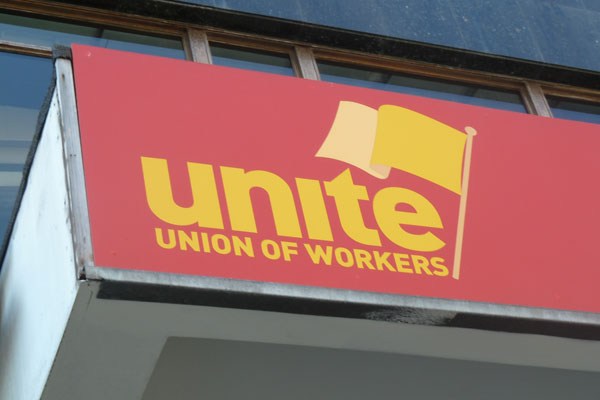
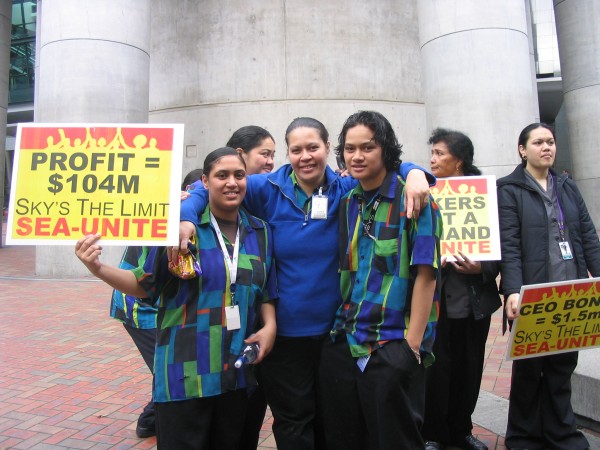
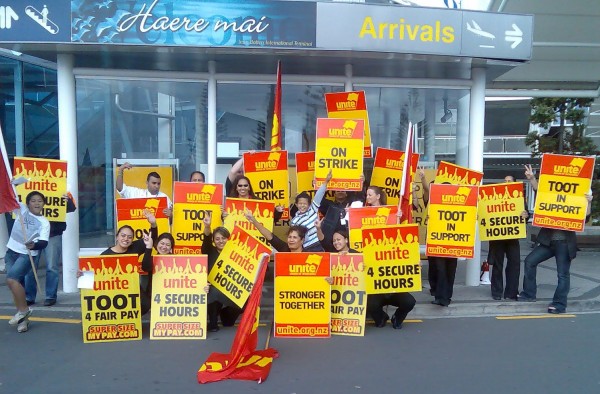
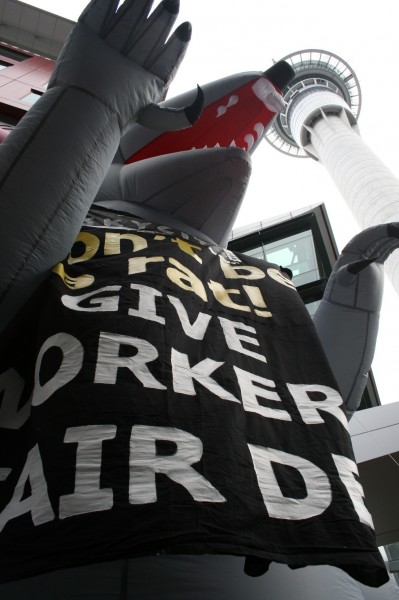
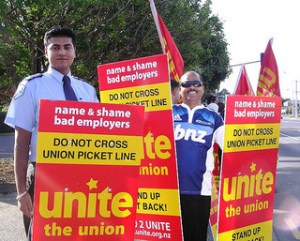
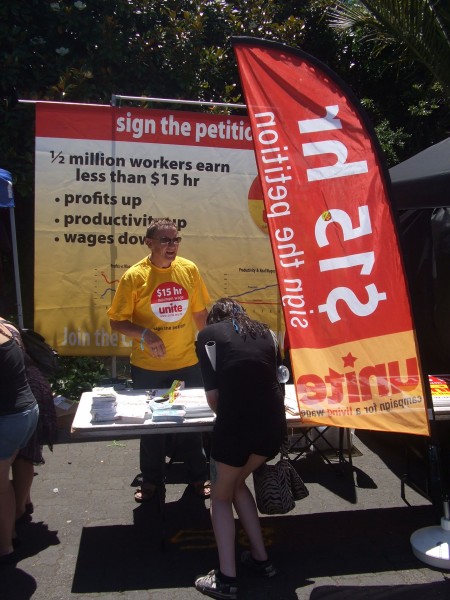
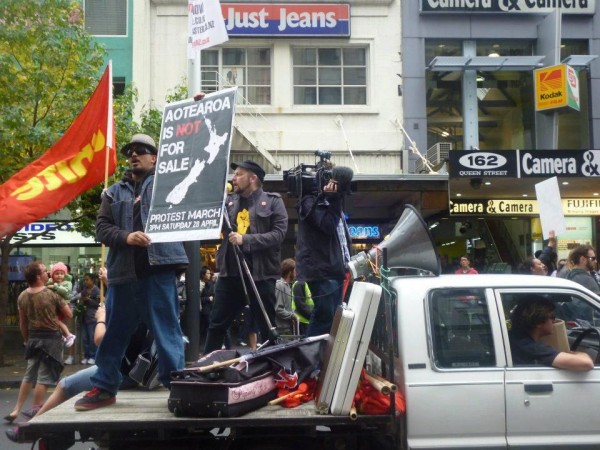
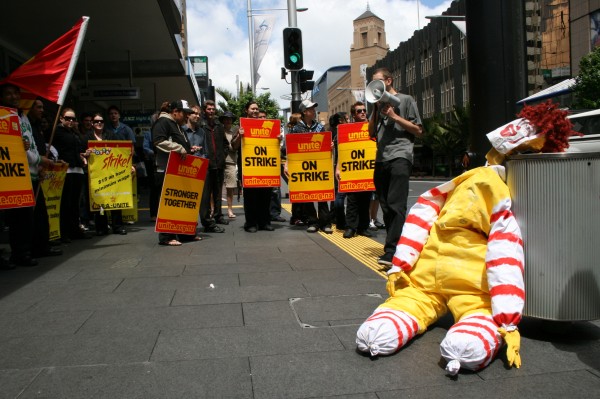
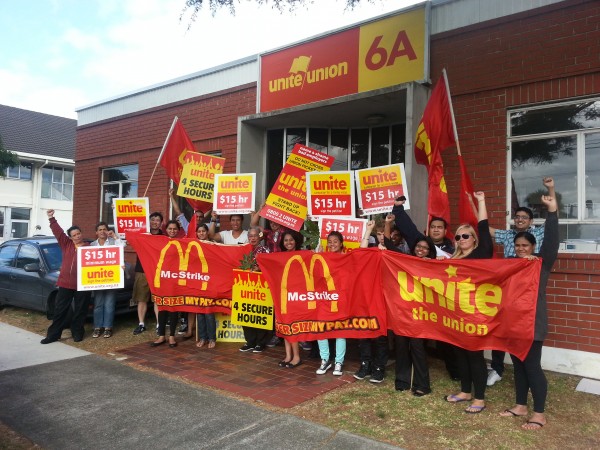
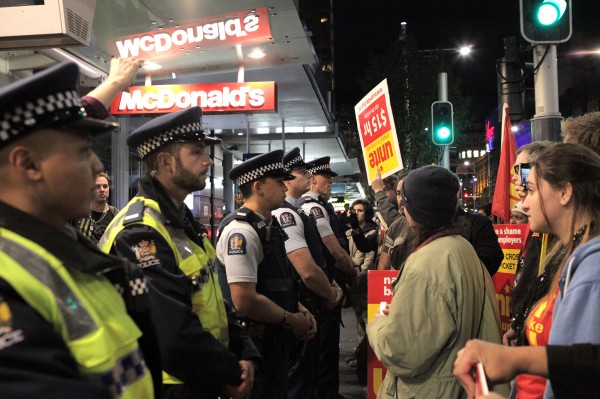
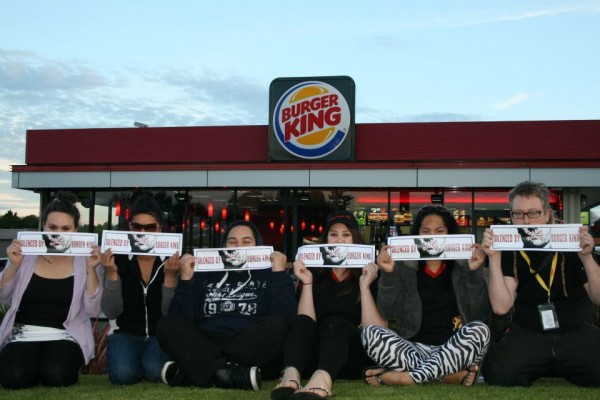




Hi Mike
I have read your three blogs so far and they are a fascinating read.
Glad to see someone is sticking up for the young workers of these big conglomerates.
Thanks for another contribution covering Unite’s history, with success, struggles and reports on what may need to be done better in future.
If only more workers realise the risks they take, by not being unionised. We must overcome fear and division, but that is a huge challenge in a country that has been divided methodically for decades now.
We need a change of government, and while I am very worried about the prospects, there may still be hope.
Best wishes to you and UNITE, dear Mike!
[…] Part Three […]
[…] Part Three […]
Comments are closed.